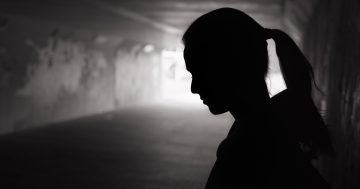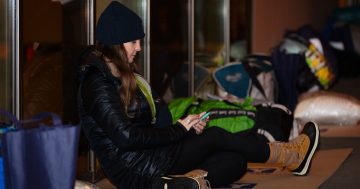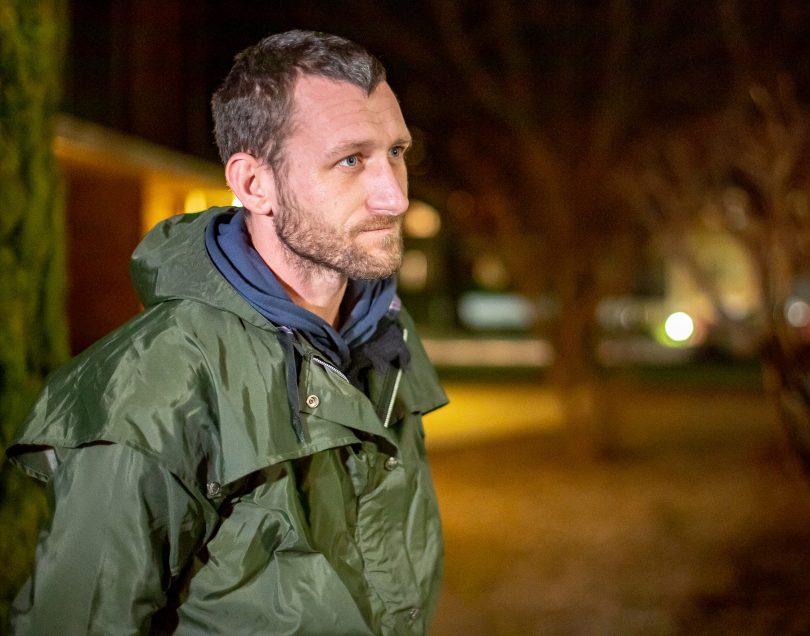
Homeless man Josh at St Columba’s Uniting Church hall in Braddon: “You are never truly safe.” Photos: George Tsotsos.
There are renewed calls for the ACT Government to establish a dedicated crisis shelter for the Territory’s growing numbers of homeless men.
The Government has announced new services for women, youth, and asylum seekers and migrants in recent weeks but there appears to be an ongoing gap in support for men on the streets.
Volunteer-led Safe Shelter ACT, which uses three church halls in the Inner North to give rough sleepers a roof over their heads during the colder months, has reported a surge in demand this winter with many of their ‘guests’ refusing to go to what official supportive accommodation there is due to fears for their safety and the cost.
Coordinator Richard Griffiths said a managed walk-in shelter big enough to cater for the growing demand and where the men could be assisted into more permanent housing was needed, as well as a public inquiry to establish the number of homeless in the ACT and find out why some men appear to be refusing to go into supportive accommodation.
Government policy opposes emergency shelters because it is believed that they become permanent and do not lead to secure housing but Mr Griffiths said the key was to get men off the streets first, so they were safe, warm and had a chance to access services and find employment.

Nine weeks into winter, Safe Shelter’s latest figures show its 118 volunteers have provided a safe place for homeless men, mainly from around Civic, to sleep every night of the week, for a total of 412 guest-nights, more than double the number at the same point last year of 204. Some have had to be turned away, opting to sleep outside.
It says that of the 49 individual homeless men who have been accommodated, at this stage 37 have stayed for less than a week, suggesting that over 75 per cent of all Safe Shelter’s guests have then found a pathway out of their situation.
“They’ve come in here and had a rest, and they’ve found somewhere else to go so I reckon that’s a pathway,” Mr Griffiths said.
“Some under their own steam, some with the assistance of various welfare services. Safe Shelter’s volunteers can claim some credit for making that possible.”
Mr Griffiths said the Government needed to be more flexible, instead of expecting them to go to through a laborious four-page registration process with Onelink so they can access Government-funded services such as Vinnies’ Samaritan House and Ainslie Village.
“Instead of saying, ‘get them off the streets tonight, start to sort things out in the morning’. They are not trying to do that,” he said.
A chance encounter with welfare workers at the early morning centre at City Uniting Church after breakfast was as good it got in terms of referral to support services.
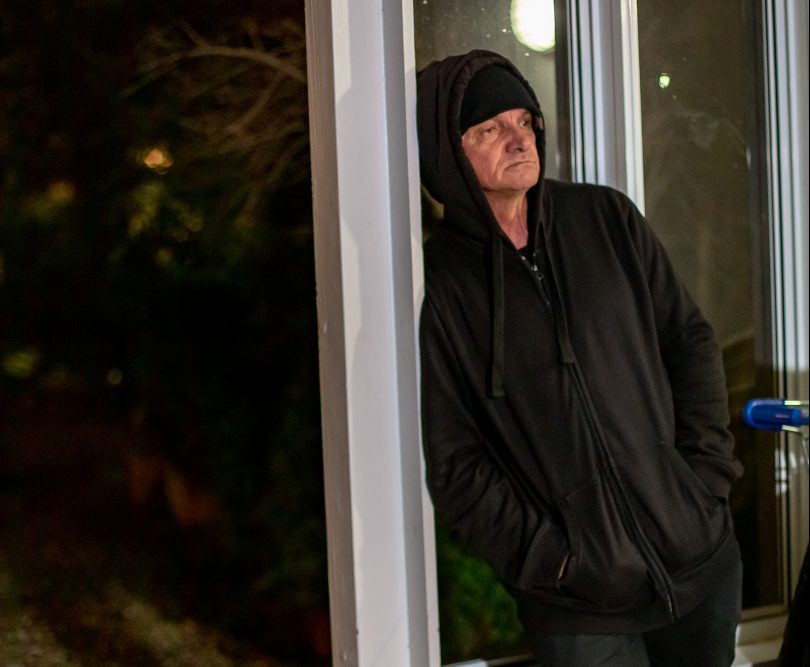
Viktor waits to enter the shelter.
On a Thursday evening outside St Columba’s Uniting Church hall in Braddon, Joshua, 28, and Viktor, an older man with all his worldly possessions in a shopping trolley, are waiting in the cold to gain entry for the night.
Inside, volunteers have set up the heated hall with eight mats and sponge beds on the floor surrounded by chairs to provide some sense of personal space. There is tea, coffee, and soup and a TV.
Both men say Ainslie Village is too dangerous. “I choose to be here and not Ainslie Village,” Josh said. “There’s rampant drug abuse and the police don’t enter that facility, they stay at the front gate and don’t engage at all. It’s a lawless place,” Josh said.
Viktor says he’s been bashed up and robbed three times.
Josh has been homeless for five years and this is his second winter with Safe Shelter. With a difficult background of family violence, state care and intermittent work, Josh finds himself in a typical Catch-22 situation of not being able to get a job without a fixed address and not being able to find housing without a job. His Newstart allowance is barely enough for him to survive on let alone afford housing, and he laments the stigma associated with being homeless and lack of personal hygiene.
He calls Safe Shelter ‘God’s blessing’, saying your life is threatened to be out on the streets in Canberra in winter. “Threats of violence are real, threats of intimidation on a daily basis, you are never truly safe, it can be quite confronting the first few times,” he said.
Josh came across from Queanbeyan to find a better life in the ACT, and he still hopes to find it – ‘somewhere warm to sleep that I can call my own, and reliable work’.
Viktor has been on the streets for two years after losing his accommodation in Queanbeyan where he had ‘problems’ with his housemate and a run-in with the law.
He hasn’t worked since a building site accident in 2007 and gets by on a disability pension. He also has a heart condition but seems resigned to his lot and not about to complain.
“I won’t whinge and complain. I live day by day. If I wake up in the morning it’s a blessing, if I don’t wake up in the morning, like a couple of times nearly didn’t, bad luck,” he said, saying it’s worse for the women and children on the street.
When the weather warms, Josh and Viktor will find somewhere safe to be but they are not about to say where.
Both think the Government could do more to help, and have nothing but praise for the volunteers at Safe Shelter.
One of them is Michael Gardiner, in his first winter but now a ‘veteran’ of three nights with Safe Shelter.
He takes me through the routine, explaining how each guest is admitted separately and then has to agree to the shelter’s rules, before being allowed to find a spot.
“They can do what they want but they have to keep quiet,” he said.
Lights dim at 10pm but most guests are exhausted and asleep by then. They have to be out by 6.30 in the morning and the hall needs to be returned to its original state.
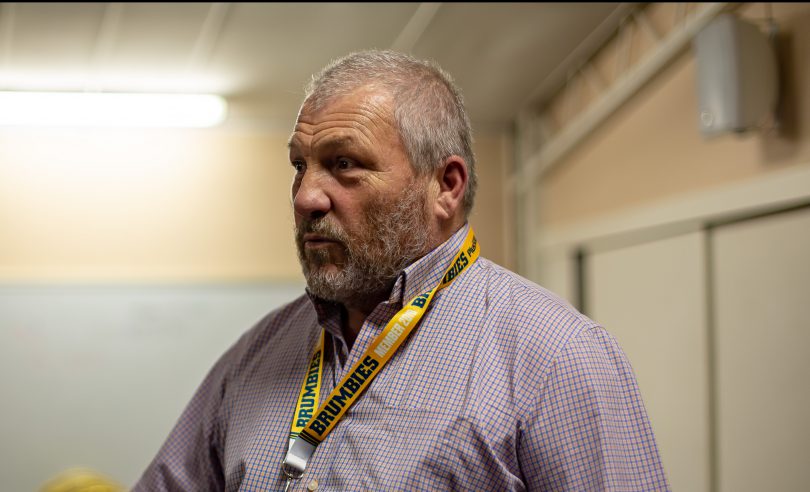
Volunteer Michael Gardiner: “I think we should do better.”
One of the challenges, says Michael, is understanding where the guests have come from, without judgment.
“We tend to have pretty safe, normal lives, they have to live on the street which is pretty hard so that’s a challenge to not pre-judge them and just accept the way they are, so they hopefully have a quiet and good night,” he said.
The hall can take eight, nine at a pinch, and it has been ‘pretty full’. Some have dogs, and sleep outside where at least it is safer.
Mr Gardiner says the level of homelessness in an affluent city like Canberra is ‘shocking’, saying it is not limited to just one group of people.
“I thought we could do better,” he said. “It’s always revealing, the cross-section of people. Somebody said to me you’re only one step away from being homeless – people can have an accident, divorce, get ill and they could be out on the streets.
“I think we should do better. That’s why I do what I do – I feel I have to contribute.”
Region Media visits St Columba's Uniting Church Hall in Braddon, one of three Inner North halls where Safe Shelter ACT gives the ACT's growing number of homeless men a warm place to sleep during the winter. We talk to 'guests' Josh and Viktor about life on the street, and volunteer Michael Gardiner about a night at Safe Shelter.
Posted by The RiotACT on Sunday, June 30, 2019
He backs calls for a permanent shelter that can help people get back into the workforce.
“I think there is a disconnect between this level and what the ACT Government thinks they’re doing. There could be more done,” he said.
Mr Griffiths says that with the loss of the inner city public housing flats and Havelock House now servicing NDIS clients, the amount of accommodation in the city for the likes of his guests has fallen.
Samaritan House can take 12 but requires payment of $25 a night, which, as Josh says, doesn’t leave much left from Newstart.
The other emerging issue is that those who are lucky enough to be in public housing are letting ‘mates’ stay over but finding they will not leave, and they are unable to be evicted because technically they are not tenants.
Many homeless are also unwell and have mental health issues exacerbated by the cold, and are in need of a managed facility with support services.
“If the Government is going to deal with those sorts of people they’ve got to put them into community housing, instead of public housing,” Mr Griffiths said. “The recession is here, it’s not just on the way, and there is going to be a lot more people on the streets.”












